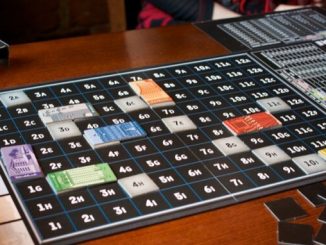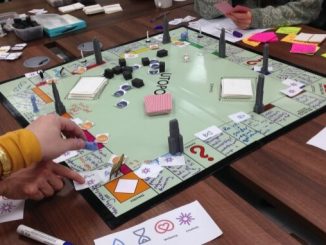Welcome to issue fourteen of Ludogogy Magazine – Economics
We make the themes in Ludogogy deliberately loose, to encourage a wide variety of interpretations, and this issue is no exception. There are a multitude of ways in which the word ‘Economics’ can be interpreted, in terms of games-based learning and gamification, and you will find many of them here.
There are many games on the market which are about money and economics. In fact, that used to be true for nearly every ‘business game’ or simulation that ever graced a corporate training room. The main metric to decide whether one ‘wins’ was pretty much always the bottom line. This is changing steadily as the scope of games-based learning has grown to include more ‘soft skills’ and to encompass more narrative and reflective mechanisms.
But even games which are not about commercial interactions, often have an in-game economy – a way of defining value, creating it and spending it, to achieve one’s aims in the game. And creating those economies is a non-trivial design problem. Get it right and you enhance the play experience. Get it wrong and you have a game which can become unplayable, or worse, in a games-based learning setting, which creates behaviours that are exactly the opposite to what is desired or intended.
You will also find here, articles on games which are about changing economic systems and challenging received wisdom about how the world works. It’s definitely a rattle bag this month.
We hope you find it interesting and edifying.
Explore:
A game which teaches investment skills
Spreadsheets as a game platform
A Utopian ‘hack’ of Monopoly
Acquire or Monopoly – which teaches Economics better?
Much more
We are now accepting submissions for the following themes:
Issue 15 (January) ‘Winning’ – deadline 26 December – Designing ‘win-states’ in games to keep players playing, competition vs cooperation (or balancing the two), designing and implementing scoring systems, the psychological/pedagogical implications of winning (or losing) in learning games, how different player types ‘win’ etc.
Issue 16 (March) ‘Co-creation’ – deadline 20 February – The challenges and joys inherent in working with others to create games and learning. Working with / creating briefs for other professionals. Co-creating with clients and players. Games which are created as they are played. The role of the designer and the player in co-creating experiences etc.
Send proposals or drafts to [email protected]
Stay at a sensible distance, Stay Safe, Stay Playful








